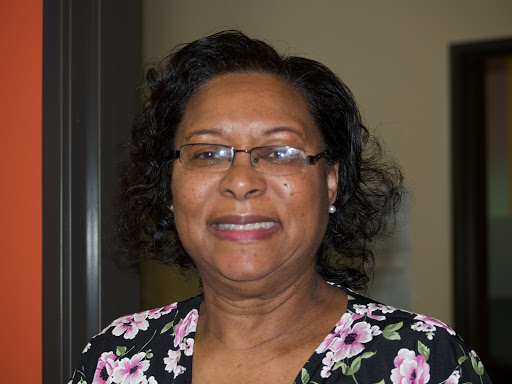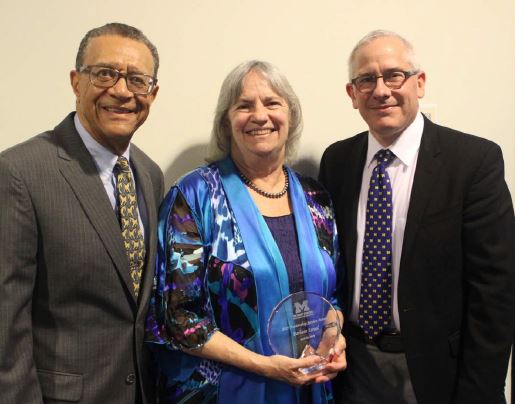
Dr. Gwendolyn A. Daniels, DNP, MSN, RN has applied 20 years’ experience as former Director of Public Health Nursing with the then City of Detroit Department of Health and Wellness Promotion to help design the structure and operations of the private, non-profit Institute for Population Health (IPH).
Daniels was asked to name the organization, and chose “The Institute for Population Health” because the vision was to deliver data driven, holistic, and equitable services to vulnerable populations in the Detroit metropolitan area. As a private non-profit business, IPH has fulfilled its mission to advance positive health outcomes in populations and communities since incorporating in 2012.
 Daniels is a founding member of the IPH leadership team and has held the positions of Vice President of Community and Consumer Engagement, Chief Operations Officer, and Interim Chief Executive Officer (CEO). She became the Interim Chief Executive Officer in 2016 when the founding President and CEO took a new position to lead another state-wide organization. In April of 2019, the IPH Governing Chairman and the Board of Directors unanimously voted to approve Daniels as Chief Executive Officer (CEO).
Daniels is a founding member of the IPH leadership team and has held the positions of Vice President of Community and Consumer Engagement, Chief Operations Officer, and Interim Chief Executive Officer (CEO). She became the Interim Chief Executive Officer in 2016 when the founding President and CEO took a new position to lead another state-wide organization. In April of 2019, the IPH Governing Chairman and the Board of Directors unanimously voted to approve Daniels as Chief Executive Officer (CEO).
In this new role as CEO, Daniels will continue to lead the operations of clinical services as a Designated Federally Qualified Health Center (FQHC)Look A Like under the U.S. Department of Health and Human Services, Health Resources and Service Administration (HRSA) at three locations in Detroit including a School-Based Health Center. Other responsibilities include serving as the Project Director for a second round of funding through the HRSA Healthy Start Initiatives Grant Award for 2019-2024. IPH has been awarded a second round of funding for MDHHS 2019 Child Lead Exposure Elimination Grant as well.
Initially, Daniels became involved with the Detroit Urban Research Center (Detroit URC) years ago while working at the City of Detroit Health Department. At that time, community-based participatory research (CBPR) was integral to the development and implementation of community action networks to address infant mortality and lead exposure in children.
When asked if the Detroit URC has helped to advance the mission of the Institute for Population Health, Daniels responded, “As a member of the Board, I have gained more knowledge and skills regarding CBPR. Specifically, I have learned how to share power and resources to work toward a common agenda with new strategies to reduce infant mortality in the City of Detroit. In the 2019 HRSA Healthy Start Grant application, I applied the principles of CBPR to work alongside community groups, partnerships, and the academic community to engage in data collection and evaluation of strategies to determine how to act upon the findings to improve the health outcomes for women and their families.”
The overarching goals for IPH next year include: the delivery of quality primary care services, the reduction of infant mortality in the target area, increasing health care provider awareness of lead exposure during pregnancy, providing universal testing of children under the age of 3 years old for lead exposure, and educating health care providers in the community regarding human trafficking to prevent sexual violence and create protective environments for vulnerable women and girls. IPH will implement innovative evidenced based strategies to accomplish these goals.
Daniels, when asked what she wished more people knew about IPH, responded “I wish more people knew about the Community Action Network (CAN) at the Institute for Population Health. This long standing group of diverse community leaders and consumers are dedicated to addressing the social determinants of health and root causes of racial disparities in birth outcomes.”
IPH opened its doors on October 1, 2012 and without disruption has continued to provide quality health care services to the residents of the City of Detroit. In fulfillment of its mission, the 34 dedicated staff members have made a significant contribution to improve the health and wellbeing of their clients. As a result of the trained workforce, IPH has reached a new level of success. Over 3,000 clients receive services at IPH annually. With the oversight of the Governing Board of Directors, Daniels plans to “move IPH forward to sustainable growth, while upholding the values of service, integrity, excellence, innovation, and health equity.”
Previous Interviews With Board Partners
Zachary Rowe, Executive Director of Friends of Parkside
Joneigh Khaldun, Director and Health Officer at the Detroit Health Department
Suzanne Cleage, Director of Neighborhood Growth at Eastside Community Network
Lidia Reyes-Flores, Executive Director of Latino Family Services
Guy O. Williams, President and CEO of Detroiters Working for Environmental Justice
Sheilah Clay, President and CEO of Neighborhood Service Organization
Angela G. Reyes, Detroit Hispanic Development Corporation
![]()






 Daniels is a founding member of the IPH leadership team and has held the positions of Vice President of Community and Consumer Engagement, Chief Operations Officer, and Interim Chief Executive Officer (CEO). She became the Interim Chief Executive Officer in 2016 when the founding President and CEO took a new position to lead another state-wide organization. In April of 2019, the IPH Governing Chairman and the Board of Directors unanimously voted to approve Daniels as Chief Executive Officer (CEO).
Daniels is a founding member of the IPH leadership team and has held the positions of Vice President of Community and Consumer Engagement, Chief Operations Officer, and Interim Chief Executive Officer (CEO). She became the Interim Chief Executive Officer in 2016 when the founding President and CEO took a new position to lead another state-wide organization. In April of 2019, the IPH Governing Chairman and the Board of Directors unanimously voted to approve Daniels as Chief Executive Officer (CEO). 

 Barbara Israel, Marie O'Neill, and Carol Gray with the NSO lobby Man in the City
Barbara Israel, Marie O'Neill, and Carol Gray with the NSO lobby Man in the City